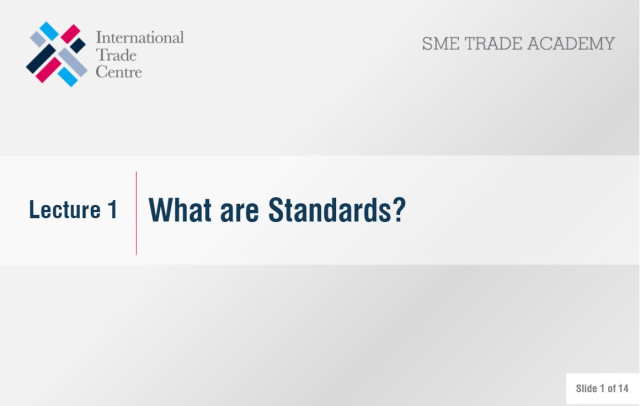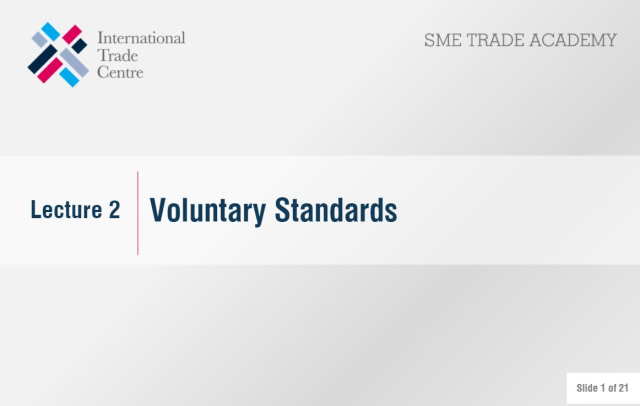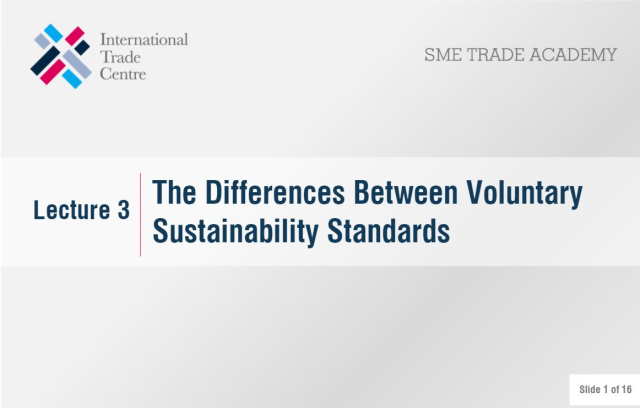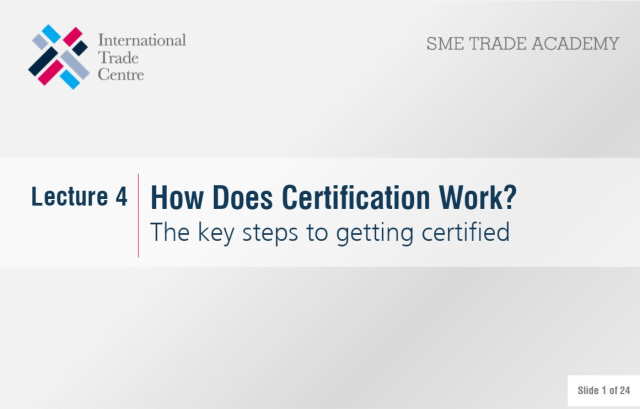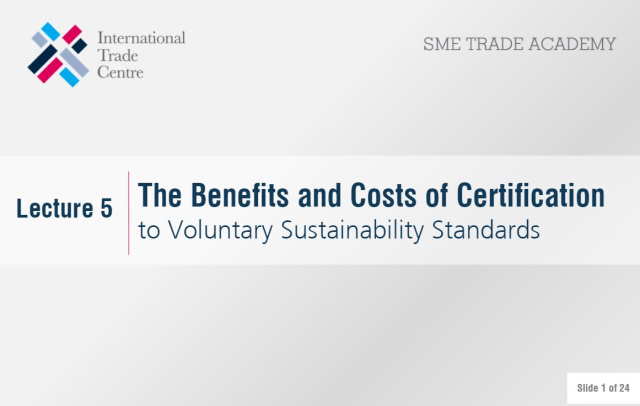Knowledge base
Learn how to use the Standards Map, how data is collected and checked and read users testimonies and stories!
- Methodology
- Data availability
- E-learning
- Tutorials
- FAQ
- Glossary
Methodology, data protocols and updates
Standards participation on Standards Map is absolutely free-of-charge and accessible for all sustainability standards organizations that meet the following rules:
- Existence of a published set of criteria and indicators: “the requirements”
- The requirements include criteria that address at least one pillar of sustainable development – Social / Environment / Economic – and/or which focus on Ethics or Quality Management
Should standards wish to take part in Standards Map, and respond to the aforementioned criteria, we invite them to contact us.
Standards organizations should know that they will be actively involved in the process, helping the data collection and analysis of their standards.
The ITC database is comprised of 1650 baseline indicators, which allow the comparison of standards on their:
- Environmental performance (protection of forest, soil, water, biodiversity climate…)
- Social performance (protection of human rights, labour rights, local communities…)
- Management and ethical performance (supply chain responsibilities, sustainability management …)
- Quality performance (manufactured products, food systems…)
- Operational performance (assurance, standard setting, traceability, claims…)
The Standards Map generates graphs and statistics on standards performance, which also allows for the comparison of several standards (sided by side).
Standards Map is the only web platform providing information at such a high level of detail and accuracy on standards.
The process of data collection, analysis and publication in Standards Map is managed through a robust process, with external control and systematic participation of standards organizations.
This guaranties the accuracy and neutrality of the information.
- As first step, the Standards Map team loads the information into the ITC database, and assesses it against the benchmarking indicators, using official information provided by the standard organization.
- Then, an independent expert reviews the information in depth. This expert is knowledgeable about the standard initiative and specialised in the industry sectors and thematic areas it covers.
- After that, the standard organization checks, revises and completes the information.
This process is iterative, and each party reviews the information as often as needed.
Once the information is approved by all parties, it is published on Standards Map.
The key and unique feature of the Standards Map tool is that all information that is accessible online is reviewed and quality-controlled by each participating standard organization.
Standards are frequently reviewed, and their systems processes evolve constantly. The ITC database also goes through regular revisions and maintenance updates.
As a result, standards information is constantly updated in Standards Map.
In general, large standards updates are conducted on a biannual basis, involving the process as described above
Within this 2-year cycle, ad-hoc changes and adaptations are always possible. These are addressed by the Standards Team whenever there is a request, or a gap identified. The standards organization also informs ITC if changes are made to their standards and processes.
The benchmarks and information displayed on the Standards Map are therefore up to date, accurate and frequently revised to reflect the latest evolutions on standards and international agreements on sustainability.
ITC, as an agency of the United Nations, has the responsibility to deliver accurate, comprehensive and unbiased information. Credibility and integrity of the information is therefore absolutely crucial and must be achieved through the use of strict content management protocols.
The Standards Map team has developed these data protocols to guarantee integrity and credibility of the information loaded into the Standards Map database. These data protocols include external quality controls of the data as well as a participation process for all standard organizations.
All parties contributing to the addition of information in the database follow these protocols.
Data entered in Standards Map is not only impartial, but also credible as it has been quality checked by the participating standard organizations.
Standards Map does not make any value judgments nor rate standards.
Impartiality, quality, transparency and neutrality are key features and objectives of the Standards Map tool.
Availability and latest up-dates of data in Standards Map
Data entered in Standards Map is not only impartial, but also credible as it has been quality checked by the participating standard organizations. Standard organizations review the information which is initially entered by ITC, and reviewed by third party experts, and provides comments or requests changes to be made. All changes made by the standard are tracked and can only be accepted following consultations with ITC. Once ITC and the standard organization agree on the content of the data, the standard record is published on the Standards Map website.
| Standards Name | Last Updated in Standards Map |
|---|---|
| A.I.S.E | Jul-22 |
| ABNT Rótulo Ecológico | Jan-20 |
| ABVTEX Programme | Jun-22 |
| ADM Responsible Soybean Standard | Mar-22 |
| AEPC CCC (Disha) | Nov-19 |
| Agricultura Orgánica - Unión Europea | May-21 |
| Agricultura Sustentable Certificada | Oct-21 |
| Alliance for Water Stewardship - AWS | May-21 |
| Aluminium Stewardship Initiative | Feb-22 |
| Amaggi Responsible Standard | Oct-21 |
| Amfori - BSCI | Jan-20 |
| amfori Business Environmental Performance Initiative - Level 1 | Mar-19 |
| amfori Business Environmental Performance Initiative - Level 2 | Mar-19 |
| amfori Business Environmental Performance Initiative - Level 3 | Mar-19 |
| Aquaculture Stewardship Council - ASC - Pangasius | Apr-20 |
| Aquaculture Stewardship Council - ASC - Salmon | Apr-20 |
| Aquaculture Stewardship Council - ASC - Shrimp | Apr-20 |
| Aquaculture Stewardship Council - ASC - Tilapia | Jun-20 |
| RSO - Agriculture — Sustainability and eco-labelling | Nov-21 |
| ASC - Camarones/Langostino | Dec-20 |
| ASC-MSC Seaweed (Algae) Standard | Apr-22 |
| ASEAN RAI Guidelines | Mar-21 |
| Better Biomass (new name for the NTA 8080 Approved certificate) | Nov-18 |
| Better Cotton Initiative - BCI | Jun-22 |
| Bio Suisse | Jan-21 |
| Biosphere Destination Community | Jan-20 |
| Biosphere Responsible Tourism | Mar-21 |
| bluesign | Apr-22 |
| Bonsucro | Jun-21 |
| BOPP Standard - Grower Standard | Jun-19 |
| BOPP Standard - Packhouse Standard | Jun-19 |
| Bord Bia - Origin Green Sustainable Dairy Assurance Scheme - Producer Standard | Mar-20 |
| Bord Bia - Sustainable Beef and Lamb Assurance Scheme (SBLAS) | Oct-19 |
| Bord Bia - Sustainable Horticulture Assurance Scheme (SHAS) | Oct-19 |
| Botswana Ecotourism Certification System Accomodation Standards | Nov-19 |
| Botswana Ecotourism Certification System Ecotour Standards | Nov-19 |
| BRCGS - Food Safety | Nov-21 |
| BRCGS Inocuidad Alimentaria | Jun-21 |
| Brord Bia - Sustainable Egg Assuarnce Scheme (SEAS) | Oct-19 |
| Bunge Pro-S Assuring Sustainable Sourcing | Nov-21 |
| CanadaGAP | Sep-20 |
| Carbon Trust | Jan-21 |
| Cargill Triple S Soya Products | May-21 |
| Cefetra Certified Responsible Soya Standard | May-21 |
| Certified Elephant Friendly™ Tea | Nov-20 |
| Certified Sea Turtle Friendly™ Tourism | Jun-20 |
| Certified Wildlife Frendly | Jan-22 |
| China Environmental Labelling- CEL | Mar-21 |
| China Green Food | Mar-22 |
| China National Organic Products Certification Program | Mar-21 |
| China-GAP National Standards | Mar-21 |
| CIIGreenCo | Jun-19 |
| Clean Clothes Campaign | Jan-21 |
| Climate Community and Biodiversity Standards - CCBS | Feb-19 |
| Cocoa Horizons - Barry Callebaut | Sep-20 |
| Code of Practice for Sustainable Flower Production - EHPEA | Jan-20 |
| Codex Alimentarius - HACCP | May-22 |
| Codigo Nacional de Sustentibilidad de la Industria Vitivinicola (Chile) | Feb-19 |
| Coffee Sustainability Reference Code | Nov-21 |
| Comercio Justo Internacional - Organizaciones de Pequenos Productores | Dec-20 |
| Coporate Sustainability Compact for Textile and Apparel Industry | Jan-21 |
| Cotton Made in Africa | Mar-22 |
| CSQA | Oct-21 |
| Donau Soy | Jun-21 |
| East African Organic Standard | Feb-18 |
| Echar PA'LANTE Colcocoa | Sep-19 |
| Eco Awards Namibia-Accommodation establishment | Mar-21 |
| ECO PASSPORT by OEKO-TEX® | Nov-21 |
| Eco Tourism Kenya | Mar-21 |
| ECOCERT Detergents Made with Organics | Jul-22 |
| Ecogarantie | Jul-22 |
| EcoVadis | May-22 |
| Ekolabel Indonesia | Feb-19 |
| Epeat | Jun-20 |
| Equitable Food Initiative - EFI | Feb-19 |
| Equitable Origin - EO - EO100TM Standard | May-20 |
| Esencial COSTA RICA (PROCOMER) | Jan-20 |
| Ethical Tea Partnership - ETP | Dec-16 |
| Ethical Trading Initiative - ETI | Jan-20 |
| EU Ecolabel | Mar-20 |
| EU Ecolabel Detergents | Jul-22 |
| EU Ecolabel Paper | Jul-22 |
| EU Ecolabel Textiles | Jul-22 |
| EU Organic Farming | Feb-21 |
| Europe Soya | Jun-21 |
| European Ecotourism Labelling Standard - EETLS | Mar-20 |
| European Feed ingredients Safety Certification - EFISC | Aug-19 |
| Fair for life | Jun-22 |
| Fair Labour Association - FLA | Jan-22 |
| Fair Stone | Jan-22 |
| Fair Trade Tourism Product Certification Standard - FTT | Dec-18 |
| Fair Trade USA Agriculture Production Standard Small Farms | Mar-21 |
| Fair Trade USA Agriculture Production Standard Large Farms | Mar-21 |
| Fair Wage | Jan-18 |
| Fair Wear Foundation | Jan-21 |
| Fairmined Standard for Licensed brand | Mar-21 |
| Fairmined Standard for Mining Organizations | Mar-21 |
| Fairmined Standard for Suppliers | Mar-21 |
| Fairtrade International - Hired Labour | Jan-20 |
| Fairtrade International - Small Producers Organizations | Jan-21 |
| Fairtrade International - Small Producers Organizations - Cocoa | Mar-21 |
| Fairtrade International Gold | Mar-20 |
| Fairtrade International Trader | Mar-20 |
| FairWild | Jun-21 |
| FAMI QS | Aug-20 |
| FEFAC Soy Sourcing Guidelines 2021 | Jun-21 |
| FEMAS Responsible Sourcing of Agricultural & Natural Products | Mar-22 |
| Flor Ecuador | Sep-19 |
| Florimark | Apr-22 |
| Florverde® Sustainable Flowers | Jul-22 |
| Flowers and Ornamentals Sustainability Standard - KFC Gold and Silver Level | Jan-20 |
| Food Alliance | Apr-20 |
| For Life | Jan-21 |
| Forest Stewardship Council - FSC - Forest Management | Feb-21 |
| FOS - Wild - Generic Sustainable fishing Requirements | Jun-20 |
| Friend of the Sea - Aqua Marine | Feb-21 |
| Friend of the Sea - Chain of Custody | Feb-21 |
| FSC Standard for Chain of Custody Certification | Feb-21 |
| FSSC22000 | Feb-22 |
| Global Organic Textile Standard - GOTS | May-22 |
| Global Red Meat Standard - GRMS | Mar-21 |
| Global Reporting Initiative - GRI | Apr-21 |
| Global Reporting Initiative - GRI - Spanish version | Apr-21 |
| Global Seafood Alliance - BAP standards | Mar-22 |
| Global Sustainable Tourism Criteria for Destinations | Jan-20 |
| Global Sustainable Tourism Criteria for Hotel and Tour Operators | Jan-20 |
| GlobalG.A.P - Aquaculture | Apr-16 |
| GlobalG.A.P - Crops | Jun-20 |
| GlobalG.A.P - Floriculture | Apr-18 |
| GlobalG.A.P - Livestock | Apr-16 |
| GLOBALG.A.P. Risk Assessment on Social Practice (GRASP) | Apr-17 |
| GMP + International | Aug-19 |
| Gold Standard | Apr-20 |
| Good Environmental Choice Australia (GECA) - Floor Coverings | Jan-21 |
| Good Environmental Choice Australia (GECA) - Furniture Fitting and Foam | Jan-21 |
| Good Environmental Choice Australia (GECA) - Panel Boards (685) | Jan-21 |
| GoodWeave | Feb-21 |
| Green Choice Philippines | Feb-21 |
| Green Label Thailand | Jul-20 |
| Green Mark Taiwan | Jan-20 |
| Green Seal | Mar-21 |
| Green-e | Aug-20 |
| GreenLine Responsible Tourism | Nov-20 |
| Guide on social responsibility for chinese international contractors - CHINA | Jan-21 |
| HALAL - Cosmetic and Personal Care - MS 2200:PART1:2008 | Mar-16 |
| HALAL - Requirements for Retailing - MS 2400-3:2010 | Mar-16 |
| Halal Food - MS 1500:2009 - General Guidelines | Mar-16 |
| Halal food - NM 08.0.800 - 2012 (Morocco) | Dec-16 |
| Halal Food - SMICC | Mar-16 |
| Halal food preparation - Turkish Standard | Mar-16 |
| Hand In Hand - Rapunzel | Jan-20 |
| Heritage Certification - Hotels and Tourist Accommodation | Jan-20 |
| Hong Kong Accredited Fish Farm Scheme | Jul-20 |
| Hong Kong Green Label | Apr-22 |
| ICTI Ethical Toy Program | Dec-20 |
| IFC Performance Standards | Jan-17 |
| IFOAM Standards | Mar-22 |
| IGEP | Dec-21 |
| ILO Labour Standards | Mar-16 |
| Initiative Compliance and Sustainability Environmental Criteria | Jan-19 |
| Initiative Compliance and Sustainability Social Criteria | Jan-19 |
| International Code of Consuct for the Production of Cut Flowers | 43739 |
| International Council on Mining and Metals ICMM | Apr-21 |
| International Featured Standards - IFS | Oct-20 |
| IP-Suisse Guidelines for cereals | Mar-22 |
| IP-Suisse Guidelines for fruits and vegetables | Mar-22 |
| IP-Suisse Guidelines for meat | Mar-22 |
| IP-Suisse Guidelines for milk | Mar-22 |
| ISCC EU | Mar-22 |
| ISCC Plus | Mar-22 |
| ISCC PLUS - Voluntary Add-ons | Apr-17 |
| IVN Naturleder | Dec-21 |
| KRAV | Jan-20 |
| Lasting Initiative for Earth - LIFE Certification | Jun-21 |
| LBCS Cacao – Comercio Justo (Perú) | Jun-20 |
| LBCS Cacao – Orgánico (Perú) | Jun-21 |
| LEAF | Mar-21 |
| LEATHER STANDARD by Oeko-Tex | Nov-20 |
| Lineamientos Basicos para la produccion de Quinua - LBQS - Calidad | Jun-21 |
| Lineamientos Basicos para la produccion de Quinua - LBQS - Comercio Justo | Jun-21 |
| Lineamientos Basicos para la produccion de Quinua - LBQS -- Organico | Jun-21 |
| Lineamientos basicos para un Cacao Sostenible – Requisitos para las organizaciones de productores – Colombia | Jun-21 |
| Lineamientos basicos para un Cacao Sostenible – Requisitos para los productores – Colombia | Jun-21 |
| Louis Dreyfus Company Program for Sustainable Agriculture LDC | Mar-22 |
| Marine Stewardship Council - MSC | Jun-20 |
| MarinTrust Standard (formerly IFFO Global Standard for Responsible Supply) | May-22 |
| McDonalds Social Accountability Audit | Dec-21 |
| Milieukeur Plant Products - Protected Cultivation | Jun-18 |
| Milieukeur Standard for Citrus Production - South Africa | Jun-18 |
| MPS-ABC | Jan-20 |
| MPS-GAP | Jan-20 |
| MPS-Socially Qualified (SQ) | Jan-20 |
| MyBMP | May-21 |
| Nature Care Standard | Dec-21 |
| Naturland Fair | Aug-20 |
| Naturland Organic Aquaculture | Aug-21 |
| Naturland Standards on Production | Aug-20 |
| Naturland Sustainable Capture Fishery | Aug-21 |
| Naturtextil IVN certified BEST | May-22 |
| Nordic Ecolabel Laundry Detergents | |
| Norma de Turismo Comunitario (Tourcert) | Oct-20 |
| o LBCS Cacao – Calidad (Perú) | Jun-21 |
| OECD Guidelines for Multinational Enterprises | Dec-19 |
| OFDC Organic Product Certification Standard | Mar-20 |
| Öko-Tex Made in Green | Jan-21 |
| Öko-Tex Standard 100 | Sep-20 |
| On the Way to PlanetProof Plant Products | Jan-20 |
| Österreichischisches Umweltzeichen (paper) | Dec-21 |
| Pacific Organic Standard - Aquaculture | Jun-20 |
| Pacific Organic Standard - Crops | Jun-20 |
| Pacific Organic Standard - Livestock | Jun-20 |
| PEFC International - Chain of Custody of Forest Based Products | Feb-21 |
| PEFC International Forest Management | Feb-21 |
| Pharmaceutical Supply Chain Initiative | Aug-19 |
| Predator Friendly Standards | Jan-22 |
| PrimusGFS | Oct-20 |
| Produits cosmétiques Halal - PNM 08.0.802 | Dec-16 |
| ProFarm Production standard | Jul-21 |
| Protected Harvest Standards for Oranges and Mandarines | Mar-18 |
| ProTerra | May-21 |
| ProTerra Europe | Oct-21 |
| Rainforest Alliance - RA 2017 (expires July 2021) | Jul-18 |
| Rainforest Alliance 2020 | Nov-21 |
| Rainforest Alliance Sustainable Tourism Standard for Hotels and Lodging Services | Jan-20 |
| recognised - Environmental Credentials Scheme | Oct-19 |
| Red Tractor Combinable Crops and Sugar Beet Standards | Jan-22 |
| Red Tractor Fresh Produce Standards | Jan-22 |
| RedCERT 2 | Sep-19 |
| RedCERT EU | Sep-19 |
| Reglamento Tecnico para los Productos Organicos - Norma Peruana | |
| Responsible Business Alliance (RBA), former Electronics Industry Code of Conduct - EICC | Feb-20 |
| Responsible Jewellery Council - RJC | Dec-17 |
| Responsible Recycling Standard for Electronics Recyclers | Jan-21 |
| Responsible Tourism Tanzania - RTTZ | Jan-17 |
| Roundtable on Responsible Soy - RTRS | May-21 |
| Roundtable on Sustainable Palm Oil RSPO - Principles and Criteria | Apr-21 |
| Roundtable on Sustainable Palm Oil RSPO - Supply Chain Certification | Apr-21 |
| RSB Standard (Roundtable on Sustainable Biomaterials) | Feb-21 |
| RSG Requirements (based on RTRS) | Mar-16 |
| SAFA Guidelines (FAO) | Jun-17 |
| Safe Quality Food Program | Oct-20 |
| SAI Platform - Farm Sustainability Assessment | Jan-22 |
| SEDEX - SAQ | Sep-21 |
| Sedex Members Ethical Trade Audit - SMETA Best Practice Guidance | Aug-21 |
| Seychelles Sustainable Tourism Label | Jul-18 |
| SGE 21 Forética | Nov-21 |
| Simple Sri Lanka GAP | Jan-22 |
| Singapore Green Label Scheme | Feb-22 |
| Small Producers Symbol | Feb-21 |
| Social & Labour Convergence Program (SLCP) Version CAF 1.4 - Master | Mar-21 |
| Social Accountability International - SA8000 | Feb-20 |
| Social Carbon | Jan-22 |
| Sodrugestvo Sustainable Soy Programme | Mar-22 |
| Soil Association | Apr-19 |
| STeP by OEKO-TEX ® | Aug-19 |
| Sustainability Initiative of South Africa - SIZA | Jul-22 |
| Sustainable Biomass Program (SBP) | Dec-20 |
| Sustainable Farming Assurance Programme SFAP | May-21 |
| Sustainable Feed Standard SFS | Oct-16 |
| Sustainable Food Group Sustainability Standard™ Certification | Apr-21 |
| Sustainably Grown | May-20 |
| Swiss Norme Halal n°12014-03 - Les aliments Halal - Exigences | Jan-22 |
| TCO Laptops | Jul-22 |
| TCO Phones | Jul-22 |
| TerraChoice - the EcoLogo Program - UL Environment | Sep-18 |
| Textile Exchange Global Recycled Standard Version 3 | Mar-22 |
| Textile Exchange Organic Content Standard 2013 | Mar-22 |
| Textile Exchange Recycled Claim Standard 2013 | Mar-22 |
| Textile Exchange Responsible Wool Standard | Jul-22 |
| Textile Exhange Responsible Down Standard 2014 | Mar-22 |
| The Blue Angel (Paper) | Jul-22 |
| The Blue Angel (Computer) | Jul-22 |
| The Blue Angel (detergents) | Jul-22 |
| The Blue Angel (Leather) | Jul-22 |
| The Common Code for the Coffee Community - 4C | Apr-22 |
| The Oceanic Standard | Jul-22 |
| The Social & Labour Convergence Program (SLCP) CAF Version 1.4 - Step 1 | Mar-21 |
| The Social & Labour Convergence Program (SLCP) CAF Version 1.4 - Step 2 | Mar-21 |
| The Social & Labour Convergence Program (SLCP) CAF Version 1.4 - Step 3 | Mar-21 |
| Together for Sustainability | Aug-20 |
| TourCert | Oct-20 |
| Travelife Award of Excellence | Jan-22 |
| Travelife Gold Award for large hotels/groups | Jan-22 |
| Travelife Gold Award for small/medium-sized hotels | Jan-22 |
| Triple Sello | Jan-22 |
| TüV Rheinland - Green Mark Product - Furniture | Mar-21 |
| TüV Rheinland Green Product Mark - Laptops | Jul-22 |
| TÜV Rheinland Green Product Mark-Smartphones | Jul-22 |
| U.S. Cotton Trust Protocol | Nov-21 |
| U.S. Soy Sustainability Assurance Protocol | Nov-21 |
| UN Global Compact | Jul-20 |
| UN Guiding Principles on Business and Human Rights | Nov-20 |
| UNCTAD BioTrade Principles & Criteria - Marine Food Sectors | Dec-20 |
| UNCTAD BioTrade Principles & Criteria - Terrestrial Food Sectors | Nov-20 |
| UNCTAD BioTrade Principles & Criteria - Terrestrial Non-Food Sectors | Nov-20 |
| UNCTAD BioTrade Principles & Criteria - Tourism in Terrestrial Ecosystems | Jul-22 |
| UNECE Standard DDP-01 Inshell Walnuts | Dec-19 |
| UNECE Standard FFV-50 Apples | Dec-19 |
| UNILEVER Sustainable Agriculture Code | May-21 |
| Union for Ethical BioTrade - UEBT | Mar-21 |
| USDA National Organic Program - NOP | May-21 |
| VEGAPLAN GRAINS GR | Jan-22 |
| VEGAPLAN POTATOES PO | Jan-22 |
| VEGAPLAN SUGARBEET SB | Jan-22 |
| VEGAPLAN VEGETABLES PROCESSING | Jan-22 |
| Verified Carbon Standard | Dec-19 |
| VERIFLORA | Apr-22 |
| VietFarm | Jan-22 |
| Vitality Leaf | Jun-22 |
| WFTO Guarantee System | Sep-20 |
| Wine and Agricultural Ethical Trading Association (WIETA) | Feb-22 |
| Workplace Conditions Assessment - WCA | Apr-20 |
| Worldwide Responsible Accredited Production - WRAP | Nov-21 |
| Xertifix | Dec-21 |
| Xertifix Plus | Dec-21 |
| Zerya | May-16 |
| ZNU | Feb-22 |
This course introduces participants to what actually defines a standard
This course introduces participants to the various types of standards which exist and how they may impact your business.
This course introduces participants to the concepts of standards and sustainability, focusing on voluntary sustainability standards (VSS) and the various ways in which enterprises can approach them.
This course introduces participants to the main terminology and steps involved in getting their business certified
This course introduces participants to the main potential advantages and discadvantages linked to certification

How to IDENTIFY relevant standards
This short video explores how to identify and browse through the list of standard made available in Standards Map.

How to REVIEW relevant standards
Short tutorial on the Quick-Scan module of Standards Map.

How to COMPARE standards
View this video to understand how information is being portrayed in the Compare module.

How to SET standards as a REFERENCE
Watch this short video to see how a specific standard can be set as a reference.

How to Conduct a SELF-ASSESSMENT
Watch this video to see how you could take a FREE online-questionnaire to assess the sustainability of your business.
Frequently Asked Questions about the Standards Map tool and database
Sustainability standards are guidelines used by producers, manufacturers, traders, retailers, and service providers to develop good environmental, social, ethical, and food safety practices.
They can be voluntary standards, consumer-facing certification schemes, corporate code of conducts, audit protocols, reporting frameworks, or company programs.
Sustainability standards all have similar goals but differ in terms of product and geographical scope, themes of work, or processes.
For instance, some standards concentrate on the eradication of human rights violations in supply chains, while others focus on phytosanitary practices or on food quality improvement.
Many standards are accompanied by a verification process to check compliance, or with traceability processes to track products along the supply chains until consumers buy them.
Sustainability standards often reference internationally agreed rights and principles and require compliance with national laws and regulations.
Sustainability standards also have different governance models, depending on their historical developments and internal systems. They may have been developed by civil society, or by the private sector, or even by multi-stakeholder initiatives also involving public authorities.
Sustainability standards play a central role in global trade, and greatly contribute to the improvement of environmental and social compliance in supply chains.
Check out the 300+ sustainability standards presented in Standards Map!
Users may use the first module of Standards Map to identify the standards on which they would like to focus their analysis.
Navigating and understanding the plethora of standards has become a very difficult task for many producers, exporters, trade support institutions and policy makers.
All stakeholders need to understand standards, including their differences (areas covered, methodology used, etc.), and how they can aid efforts towards sustainability.
Within its unique search and comparison tool on standards, the Standards Map helps making sense of all standards data, and helps all stakeholders find the information they need on standards in any sector or area of interest.
Standards Map covers a wide area of products and sectors ranging from agriculture to textiles, mining, forestry, fishery, but also to services like tourism or finance.
Each sector presents specific challenges and opportunities related to sustainability and Standards Map presents a unique way to explain how standards address these.
Standards Map covers all regions and countries in the world, where there are operations: production, extraction, transformation, market outreach, etc.
No. Data in Standards Map cannot be downloaded.
Standard Map is actively used by companies, governments, civil society, researchers, and consumers to assess, compare, and understand in detail all sustainability standards.
What questions can Standards Map help me answer?
- Have you been approached by your current buyers and asked to comply with a specific standard?
- Do you wish to make your products or services certified as “sustainable”?
- Do you wish to diversify your product base and enter new “niche” markets?
Standards Map is currently the only tool which can answer all of these questions. Unlike many of the other systems which exist, Standards Map differentiates itself by reviewing standards making use of over 1600 criteria.
Standards Map Glossary of terms and expressions
Glossary of terms and expressions developed by the Standards Map Technical Working Group.
- A
- B
- C
- D
- E
- F
- G
- H
- I
- L
- M
- O
- P
- R
- S
- T
- V
- W
Accountability
State of being answerable for adapted decisions and activities to the interested parties of an organization
ISO 37101, Management system for sustainable development
Assessment
Combined processes of audit, review, and decision on a client’s conformity with the requirements of a standard (or of the assurance provider’s conformance with requirements for assurance)
ISEAL Assurance Code
Assurance
Demonstrable evidence that specified requirements relating to a product, process, system, person or body are fulfilled.
ISEAL Credibility Principles, adapted from ISO 17000
Audit
Systematic, documented process for obtaining records, statements of fact or other relevant information and assessing them objectively to determine the extent to which specified requirements are fulfilled.
ISEAL Assurance Code, adapted from ISO 17000
Appeal
Formal request for the reconsideration of a decision.
SSCI Glossary of Terms
Auditor
Person who performs the audit
ISEAL Assurance Code
Benchmark
Benchmarking
Practice of comparing an organization’s sustainability processes and performance to best practices
Biodiversity
Variability among living organisms from all sources, inter alia, terrestrial, marine and other aquatic ecosystems and ecological complexes of which they are part, this includes diversity within species, between species and of ecosystems
Convention on Biological Diversity (CBD), 1994
Capacity Building (or Capacity development)
Process through which individuals, organizations and societies obtain, strengthen and maintain the capabilities to set and achieve their own development objectives over time.
UNDP, Capacity Development
Certificate
Generic expression used to include all means of communicating that fulfilment of specified requirements has been demonstrated
ISEAL Assurance Code, adapted from ISO 17000
Certification
Issuance of a third-party statement that fulfilment of specified conformance requirements have been demonstrated.
SSCI Glossary of Terms
Chain of custody
Custodial sequence that occurs as ownership or control of the material supply is transferred from one custodian to another in the supply chain.
ISEAL Claims Good Practice Guide
Child labour
Refers to work which deprives children (any person under 18) of their childhood, their potential and their dignity, that is harmful to their physical and/or mental development, is likely to be hazardous or to interfere with their education
ILO Convention
Claim
Message used to set apart and promote a product, process, business or service with reference to one or more of the pillars of sustainability: social, economic and/or environmental
ISEAL Assurance Code
Code of Conduct (or Code of Ethics)
Voluntary expressions of commitment made by an organisation (private company, association of companies, NGOs, inter- government organizations) to influence its processes and activities for the benefit of the organisation itself and for the communities in which it operates, covering
sustainability issues.
Adapted from OECD Working Papers on International Investment Codes of Corporate Conduct
Community
Group of people with an arrangement of responsibilities, activities and relationships. In many, but not all, contexts, a community has a defined geographical boundary.
ISO 37101:2016, Management system for sustainable development
Competitiveness
Demonstrated ability to design, produce and commercialize an offer that fully, uniquely and continuously fulfils the needs of targeted market segments, while connecting with and drawing resources from the business environment, and achieving a sustainable return on the resources employed
ITC, SME Competitiveness Outlook
Complaint
Expression of dissatisfaction about the standard of service, actions, or lack of action
SSCI Glossary of Terms
Compliance
State of an organization that meets prescribed specifications, contract terms, regulations or standards. Compliance obligations can arise from mandatory requirements, such as applicable laws and regulations, or voluntary commitments
ASQ Quality Glossary, ISO 37101, Management system for sustainable development
Conformity Assessment
Process of determining whether someone or something meets the requirements of a standard. It can be done in one of three ways:
- first party (assessment by the organization itself),
- second party (assessment of organization by a user),
- third party (assessment of organization by an independent body).
Adapted from ISO, Glossary of Terms
Conformity Assessment Body
Third-party conformity assessment body operating certification schemes.
SSCI Glossary of Terms
Continuous Improvement
Ongoing effort of an organization to improve sustainability practices, products, services, and/or processes.
Adapted from ISO 9001
Corrective action
Action to eliminate the (root) cause(s) of a detected non-conformance/ non-compliance and to prevent recurrence
Adapted from SSCI Glossary of Terms and ISO 37101
Corporate Social Responsibility
Business’s contribution to sustainable development and response to societal and environmental concerns.
OECD, Partners for Progress
Data management
Measures using data technologies and resources to solve sustainability challenges, gathered for instance from surveys, mobile apps, sensors and crowd-sourced input and analysed with data science and visualisation. The collection and management of data can be used to detect, monitor, inform and improve sustainability processes and practices
Adapted from ISEAL Alliance excerpt on Data collection and technology innovation
Discrimination
Any distinction, exclusion or preference made on the basis of race, colour, sex, religion, political opinion, national extraction or social origin (among other characteristics), which has the effect of nullifying or impairing equality of opportunity and treatment in employment or occupation
ILO Convention C111
Due Diligence
For a company or an organization, process of identifying, reviewing and mitigating potential environmental and social risks associated with the activities of business partners, suppliers and other third parties.
Adapted from OECD guidelines on Business and Human Rights
Environment
The naturally produced physical surroundings on which living organisms are dependent
Adapted from OECD Glossary of statistical terms
Ecosystem services
Benefits people obtain from ecosystems. These include provisioning services such as food and water; regulating services such as flood and disease control; cultural services such as spiritual, recreational, and cultural benefits; and supporting services such as nutrient cycling that maintain the conditions for life on Earth
Millennium Ecosystem Assessment
Forced (or compulsory) labour
Refers to situations in which persons are coerced to work through the use of violence or intimidation, or by more subtle means such as accumulated debt, retention of identity papers or threats of denunciation to immigration authorities.
ILO Conventions 29&105
Gender equality
Situation achieved when human being from all genders enjoy the same rights and opportunities across all sectors of society, including economic participation and decision-making, and when the different behaviours, aspirations and needs of women and men are equally valued and favoured
Adapted from European Institute for Gender Equality
Governance
Grievance mechanism
Channel of communication (and associated processes) available to individuals or organisations to report concerns or complaints and address them within a formal process that offers them protection from retribution
SSCI Glossary
Group
Organized body of persons or enterprises that share similar characteristics are part of a shared internal management system and, for assessment purposes, are considered as a single client (e.g. groups of farmers, retail stores, or distributors).
ISEAL Assurance Code Version 2.0
Human Rights
Basic international standards aimed at securing dignity and equality for all. Every human being is entitled to enjoy them without discrimination. They include the right to life and liberty, freedom from slavery and torture, freedom of opinion and expression, the right to work and education
Adapted from UNGP Guidelines on Business and Human Rights
Impacts
Positive and negative long-term effects resulting from the implementation of a standards system, either directly or indirectly, intended or unintended
ISEAL Impacts Code v2 Dec. 2014, adapted from OECD Glossary, 2002
Input
Resource mobilized by a standards system, an organization or a business to support activities to further desired long‐term impacts. Examples of inputs include physical, human, financial, and capital resources.
ISEAL Impacts Code v2, Dec. 2014
Internal Management System
Documented set of procedures and processes that a group will implement to ensure it can achieve its specified requirements.
Adapted from ISEAL Assurance Code Version 2.0
Labelling
Set of consumer information tools to provide information relating to sustainable consumption and production, allowing organizations to measure performance, communicate and market the sustainability credentials of a given product.
Adapted from UNEP and Johannesburg Plan of Implementation
Labour rights
Fundamental and universal rights at work: Freedom of association, Collective bargaining, abolition of forced or compulsory labour, Equality of opportunity and treatment in employment and occupation, Protection of children and young person
ILO Conventions
Landscape (and jurisdictional) approach
Strategy to achieve sustainable practices at scale, bringing regional stakeholders to agree on and implement a shared approach to more sustainable use of natural resources and land use management, across sectors and jurisdictions.
Adapted from ISEAL Alliance excerpt on Landscape approach
Living Wage
Remuneration or compensation for a standard 48-hour work week sufficient to pay a decent standard of living for the worker and his/her family, covering food, water, housing, education, medical care, transportation, clothing, and other essential needs, including the provision for unexpected events
IDH and Global Living Wage Coalition
Market Analysis
Activity of gathering information about the size, growth, profitability, target groups and existing products of a market, which is used to inform decision making at a strategic level.
UNEP Glossary
Monitoring and Evaluation System
Ongoing functions, processes and activities through which an organisation draws conclusions about its contribution to intended outcomes and impacts.
Outcome
Likely or achieved short-term and medium-term results from the implementation of a standards system’s strategies.
ISEAL Code of Good Practice Version 6.0 – December 2014, adapted from OECD Glossary
Oversight
Assessment of an assurance provider’s demonstration of competence to carry out specific assurance tasks
ISEAL Assurance Code
Policy
Intentions and direction of an organization , as formally expressed by its top management
ISO 37101, Management system for sustainable development
Protected Areas
Clearly defined geographical space, recognised, dedicated and managed, through legal or other effective means, to achieve the long term conservation of nature with associated ecosystem services and cultural values.
IUCN Definition 2008
Public Consultation
Consultations with stakeholders to improve standards, policy or programme proposals.
Reporting
Act by an organization of giving an official report about its sustainability policy, activities, performance and results
Requirement
Need or expectation that is stated, generally implied or obligatory, describing a desired performance level or target to be achieved. It can make specific demands on how that level/target should be reached. A requirement can be based on practice, processes/systems, and outcome.
Adapted from ISO 37101:2016, Management system for sustainable development and from IISD report
Risk management
Process of risk identification, analysis and evaluation of the chance of something happening that will have an impact on objectives. It is measured in terms of a combination of the probability of an event and the severity of its consequences.
SSCI Glossary of Terms Version 1.0
Remediation/remedy
Process of providing remedy for a negative impact and the substantive outcomes that can counteract, or make good, the negative impact. These outcomes may take a range of forms such as apologies, restitution, rehabilitation, financial or non-financial compensation, and punitive sanctions as well as the prevention of harm through, for example, injunctions or guarantees of non-repetition.
Adapted from UNGP reporting Glossary
Scheme owner
Organisation that determines the objectives and scope of the standards system, as well as the rules for how the scheme will operate and the standards against which conformance will be assessed. It can be a voluntary standard-setting organisation, a company, a governmental authority, a trade association or other body
Scheme Management
Determines the objectives and scope of the scheme, as well as the rules for how the scheme will operate and the standards against which conformance will be assessed.
Adapted from the ISEAL Credibility Principles v1 June 2013
Self-assessment
Statement issued by an organization, on behalf of itself, and based on its own determination, that states its status against specified conformance requirements of a standard.
Adapted from ISO 14001
Small and Medium Enterprises
Non-subsidiary, independent firms which employ fewer than a given number of employees. SME’s integration in global supply chains can be a key driver for sustainable development.
Adapted from ITC SME Competitiveness Outlook 2015
Social impact
Direct or indirect business impacts on people: employees, workers in the value chain, customers and local communities
Adapted from UN Global Compact
Sourcing
Process of buying goods and services from the international market across geopolitical boundaries. Sustainable sourcing refers to the integration of social, ethical and environmental performance factors into the process of selecting suppliers, services and goods.
Adapted from OECD definition
Stakeholder
Person, group or organisation that has interest or concern (actual or perceived) in an organisation. Stakeholders can affect or be affected by the organisation’s actions, objectives and policies.
SSCI Glossary of Terms Version 1.0
Standard
Document that provides, for common and repeated use, rules, guidelines or characteristics for products or related processes and production methods, with which compliance is not necessarily legally mandatory, and which is dynamic and subject to change. A sustainability standard addresses the social, environmental or economic practices of a defined organization
Adapted from ISEAL Standard Setting Code, SSCI Glossary of Terms and SAI Sustainable Sourcing Guide
Supply chain
Network between a company and its suppliers to produce and distribute a specific product to the final buyer. Sustainable supply chain management involves integrating sustainable practices into the complete supply chain lifecycle, from product design and development, to material selection, manufacturing, packaging, transportation, warehousing, distribution, consumption, return and disposal.
Adapted from Sustainable Supply Chain Foundation
Support
Set of strategies to build a group’s capacities, promote the rights of its individuals and foster its access and performance towards sustainable practices.
Sustainability
Operating practices that meet the needs of present users without compromising the ability of future generations to meet their own needs. Sustainable practices support ecological, human, and economic health and vitality.
UCLA Sustainability Committee, adapted from definition of UN World Commission on Environment and Development
Theory of Change
Approach describing the intended logic of an intervention into its implementation context, the causal pathways from outputs through outcomes via intermediate states towards impact, and the external factors that influence change.
Adapted from UNEP
Third Party Assurance
Assurance activity that is performed by a person or body that is independent of the person or organization that provides the object of assurance and of user interests in that object
ISEAL Assurance Code, adapted from ISO 17000
Traceability
Completeness of the information about every step in a process chain which allows for verification of origin of the material. ISEAL Claims Good Practice Guide
Transparency
Environment in which the objectives, framework, data and information of a policy are provided to stakeholders in a comprehensible, accessible, and timely manner.
Adapted from OECD Procurement ToolBox
Value
Economic revenue that an organization gets in return for its goods or services in a way that creates positive outcomes for society, by addressing its needs and challenges, considering economic, environmental and social considerations
Adapted from Porter & Kramer, The Big idea creating shared value 2011
Verification
Confirmation, through the provision of objective evidence, that specified requirements have been fulfilled.
ISEAL Assurance Code
Worker
Individual performing work for an organization, regardless of the existence or nature of any contractual relationship with that company.
UNGP Reporting Glossary
